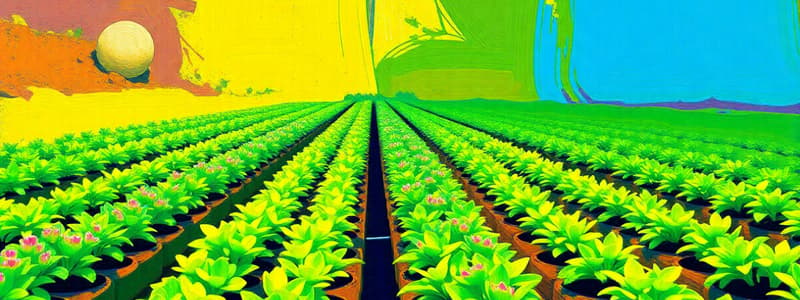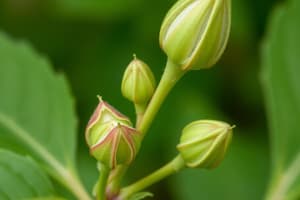Podcast
Questions and Answers
What should be avoided when planting seedlings in the same flat?
What should be avoided when planting seedlings in the same flat?
- Watering at different frequencies
- Using different types of soil
- Exposing them to sunlight
- Placing weak and vigorous seedlings together (correct)
How should light intensity be managed for young seedlings?
How should light intensity be managed for young seedlings?
- Alternated between high and low intensities frequently
- Kept at a constant low level to avoid damage
- Gradually increased to match future growing conditions (correct)
- Maximized continuously to promote growth
What condition should the soil be in when transplanting seedlings?
What condition should the soil be in when transplanting seedlings?
- Wet and saturated
- Completely dry to prevent root rot
- Moist but not saturated (correct)
- Dry and crumbly
What factors primarily condition plant growth up to flowering?
What factors primarily condition plant growth up to flowering?
When is fertilization recommended after transplanting?
When is fertilization recommended after transplanting?
What is the effect of a constant temperature between 20ºC and 22.2ºC on plants?
What is the effect of a constant temperature between 20ºC and 22.2ºC on plants?
Which condition is likely to promote higher rates of plant photosynthesis?
Which condition is likely to promote higher rates of plant photosynthesis?
How does the temperature for plant height increase change with aging?
How does the temperature for plant height increase change with aging?
What is the primary reason for varying fertilizer formulation in a fertilization program?
What is the primary reason for varying fertilizer formulation in a fertilization program?
What temperature is optimal for the growth of Begonia plants?
What temperature is optimal for the growth of Begonia plants?
What happens to Begonia plants if the temperature exceeds 21ºC, especially on short days?
What happens to Begonia plants if the temperature exceeds 21ºC, especially on short days?
Which cultivar of Celosia is known for its feathery plume-type inflorescence?
Which cultivar of Celosia is known for its feathery plume-type inflorescence?
Which series of Coleus is known for promoting colorful foliage?
Which series of Coleus is known for promoting colorful foliage?
What category of daylength requirements does Petunia fall under?
What category of daylength requirements does Petunia fall under?
Which of the following plants behaves as a day-neutral plant under varying night temperatures?
Which of the following plants behaves as a day-neutral plant under varying night temperatures?
Which bedding plant is categorized as a heavy feeder?
Which bedding plant is categorized as a heavy feeder?
What impact does a higher red/far-red ratio have on plant growth?
What impact does a higher red/far-red ratio have on plant growth?
At what temperature range does Petunia behave as a long-day plant?
At what temperature range does Petunia behave as a long-day plant?
What is the main factor influencing a plant's response to daylength?
What is the main factor influencing a plant's response to daylength?
Which of the following plants is considered a short-day plant?
Which of the following plants is considered a short-day plant?
What is the effect of increased plant density on the quality of light reaching lower leaves?
What is the effect of increased plant density on the quality of light reaching lower leaves?
Flashcards
Seedling Sorting
Seedling Sorting
Organizing seedlings by size and vigor before transplanting to ensure uniformity in flats or containers.
Watering Seedlings
Watering Seedlings
Watering seedlings at a reduced rate or frequency to maintain a drier growing medium before transplanting.
Hardening Seedlings
Hardening Seedlings
Adjusting seedling environment to outdoor conditions before transplanting to reduce mortality.
Light Intensity for Seedlings
Light Intensity for Seedlings
Signup and view all the flashcards
Transplant Soil
Transplant Soil
Signup and view all the flashcards
Daylength requirements
Daylength requirements
Signup and view all the flashcards
Long-day plants
Long-day plants
Signup and view all the flashcards
Short-day plants
Short-day plants
Signup and view all the flashcards
Day-neutral plants
Day-neutral plants
Signup and view all the flashcards
Nutritional requirement
Nutritional requirement
Signup and view all the flashcards
Light requirement (bedding plants)
Light requirement (bedding plants)
Signup and view all the flashcards
Temperature influence on daylength
Temperature influence on daylength
Signup and view all the flashcards
Inter-shading
Inter-shading
Signup and view all the flashcards
Optimal Temperature for Plant Height
Optimal Temperature for Plant Height
Signup and view all the flashcards
Begonia Propagation
Begonia Propagation
Signup and view all the flashcards
Temperature Effect on Begonia Growth
Temperature Effect on Begonia Growth
Signup and view all the flashcards
Coleus Growing Conditions
Coleus Growing Conditions
Signup and view all the flashcards
Celosia Types
Celosia Types
Signup and view all the flashcards
Temperature for Celosia
Temperature for Celosia
Signup and view all the flashcards
Fertilizer Program Variations
Fertilizer Program Variations
Signup and view all the flashcards
Plant Height and Flower Size
Plant Height and Flower Size
Signup and view all the flashcards
Study Notes
Module 3: Production and Management of Bedding Plants
- Lesson Objectives: Discuss bedding plant production management and determine water, light, temperature, and soil requirements.
- Timeframe: 4 hours
- Introduction: Focuses on the importance of selected bedding plants and factors affecting their growth and development. Includes cultural management practices like nutrition, growing media, water, light, and favorable environment.
- Activity (Let's Check!): List five common bedding plants in your local area.
- Analysis: Describe important features of bedding plants.
Bedding Plant Production
- Introduction to Bedding Plants: Mostly fast-growing annuals, typically propagated from seeds. Started in sheltered conditions, then moved to larger containers or beds.
- Seed Procurement & Storage: Select high-quality seeds with good germination rates. Store seeds at low temperatures (0°C to 5°C) and low humidity to maintain viability and vigor.
- Germination Media: Sanitized media should be well-drained and retain moisture. Coconut coir and sand (3:1 v/v) or sandy loam:coco peat:sand (1:1:1 v/v/v) are suitable mixes. Adjust pH to 5.5-6.0, and aim for a light (26 kg/0.028 cubic meter wet) bulk density.
- Sowing: Row or broadcast sowing. Cover seeds with medium, and water seeds thoroughly. Prevent the medium from becoming excessively soggy.
- Lighting: Some seeds require light during germination while others need darkness. Specific light requirements vary among species. Exposure to light or darkness before germination is critical for some. Ideal temperature for germination for many bedding plants fall between 20°C and 26°C.
- Transplanting: Transplant when seedlings have developed 2-3 true leaves, not cotyledons. Harden plants prior to transplanting by gradually adjusting the watering and light intensity. Transplant seedlings into moist but not saturated soil. Don't fertilize for at least a week after transplanting.
- Essential factors for growth up to flowering: Light intensity, duration, and quality; temperature, water, and nutrients
- Daylength and Bedding Plants: Table 5.2 shows specific day-length requirements for different bedding plants.
- Categorization of bedding plants based on nutritional requirements: Impatiens need a light to moderate amount of nutrients, while other plants may require a moderate amount or more. (Table 5.3)
Studying That Suits You
Use AI to generate personalized quizzes and flashcards to suit your learning preferences.
Related Documents
Description
Explore the essential management practices for producing bedding plants. This quiz covers factors such as water, light, temperature, and soil requirements crucial for successful growth. Additionally, you'll identify common bedding plants in your area and analyze their important features.




